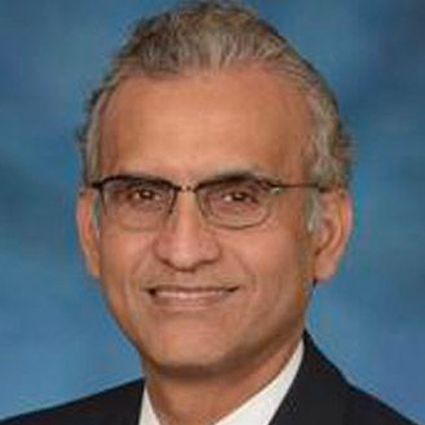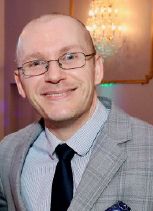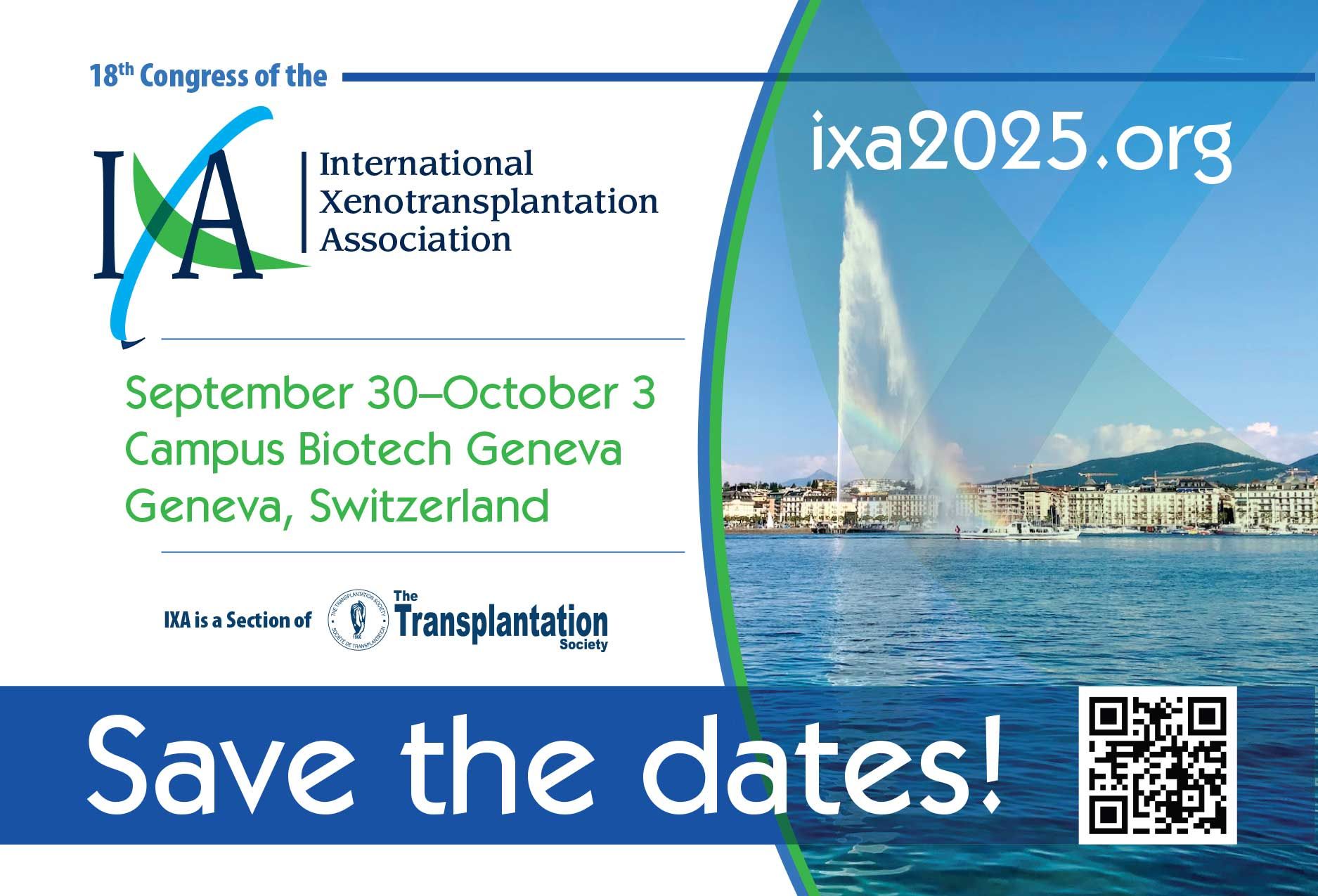Dear Colleagues and Friends
The field of xenotransplantation has progressed at an accelerated pace over the last few years. The International Xenotransplantation Association (IXA) has played a central role in this rapid progression, providing hope to millions of patients with end-stage diseases who have no treatment options available.
Most of the groundbreaking efforts produced in the field are by long-standing members of IXA, to whom IXA has provided guidance and support since its inception. Through its various platforms, IXA has promoted the fantastic efforts in the field that have produced two heart and two kidney xenotransplantations in living humans who were at the end of their life and for whom xenotransplantation was the only hope.
Public response to these dramatic transplants has been supportive. The IXA conveyed these achievements to the transplantation field through its journal, Xenotransplantation and its frequent newsletters and webinars. A major goal of IXA is to foster a collaborative environment between investigators working in the field so as to accelerate progress in the field. The IXA's support for its parent organization, The Transplantation Society (TTS), is a testament to its commitment to the field, providing experts for their webinars and any expert support that is needed in the field of xenotransplantation, thereby reassuring the community of the strength of their collaborative efforts.
The IXA’s mission remains to promote xenotransplantation as a safe, ethical and effective therapeutic modality by:
- Fostering the science of xenotransplantation through the promotion of ethical clinical and pre-clinical research, productive discourse, and collaboration.
- Educating health care providers and laypersons through broad, representative participation in interactive public debate; and
- Guiding the development of scientifically sound, internationally consistent public policy that is responsive to new developments in the field and acknowledges varying social, ethical and legal frameworks.
The IXA has worked closely with other TTS associations and other international transplantation societies to help advance the xenotransplantation field. Some of the major work by IXA includes:
- Holding a very productive biennial Congress with sister associations, CTRMS and IPITA in September 2023. In this meeting, over 247 abstracts were presented and a number of prestigious awards were given.
- 2023 Keith Reemstma Lecture awarded to Chung-Gyu Park
- 2023 Honorary Lecture awarded to Richard Pierson III
- 2023 Agnès Azimzadeh Memorial Award awarded to Linda Scobie
- 2022 Xeno-Prize Winner awarded to Muhammad Mohiuddin for the article entitled “Progressive genetic modifications of porcine cardiac xenografts extend survival to 9 months”.
- Collaborating and holding joint meetings with the Food and Drug Administration (FDA) and continuing dialogues with a number of regulatory agencies and other associations to help produce guidance on xenotransplantation. These have included the International Society for Heart and Lung Transplantation (ISHLT), the American Society of Transplantation, the Pontifical Academy for Life, and the World Health Organization (WHO) development of Changsha Communique guidelines for safety in xenotransplantation and interacting with the WHO to further refine and expand the xenotransplantation registry or find another mechanism to be able to support the registry.
- Developing public awareness of xenotransplantation through continuous engagement with the public and making them aware of its progress and potential benefits.
- Helping investigators and pig breeders to develop protocols to prevent any potential transmissions of zoonotic diseases through surveillance of xenograft recipients and herds for xenotransplantation.
- Developing close relationships between the industry partners making products for xenotransplantation.
- Publishing existing research in its journal Xenotransplantation in a timely manner.
- Promoting ethical considerations of xenotransplantation.
- Providing outreach to families of patients who have contributed their lives to Xenotransplantation – e.g. The son of the first heart xenotransplant patient was invited to the 2023 congress, where he delivered an emotional speech. The transcript of this speech was published in Xenotransplantation. Ann Faucette, wife of the second heart transplant patient, wrote about her experience, which is being published in the Xenotransplantation journal.
- Supporting young investigators in participating and contributing to the field with travel grants and achievement awards. e.g. IXA’s Young Investigator Committee has succeeded in bringing new investigators into the field, developing mentor-mentee relationships, and creating opportunities for these young investigators to work with experts in the field. IXA has also provided a platform for these young investigators to present their research at IXA’s biennial meetings.
- Promoting membership as interest in the field is developing at a rapid pace.
- Interacting with various xenotransplantation societies internationally, helping them establish xenotransplantation programs, getting regulatory permission to do research in this field, and finally preparing them for clinical translation.
- Monitoring xenotransplantation worldwide to ensure that all attempts follow regulatory and ethical guidelines.
- Xenotransplantation requires the use of animal donors, therefore, the IXA plans to develop close relationships with the United States Department of Agriculture (USDA) and similar organizations worldwide to enforce the humane use of animals in xenotransplantation research.
- Working closely with other transplantation societies, such as the ISHLT, the National Kidney Foundation, and the American Society of Transplantation, to develop guidelines for clinical xenotransplantation.
The majority of the progress in our field is conveyed to the IXA members and others interested in xenotransplantation through its redesigned and interactive website www.xenotransplantation.org. Please visit us often for the latest news.
Muhammad Mohiuddin
President, IXA
We can increase citation of our manuscripts and the journal from various search engines, particularly as the field grows rapidly. Don’t forget to submit your research to Xenotransplantation! Authors can influence the readership of their own papers using some tips provided by the publisher (www.authorservices.wiley.com/author-resources/Journal-Authors/Prepare/writing-for-seo.html). Of interest, 5 easy steps may increase the discoverability of your paper on line:
- Create a search engine friendly title
- Include 1-2 keywords related to your topic and place your keywords within the first 65 characters of your title
- Keep your title short: Consider moving a phrase from your title to the first or second sentence of your abstract
- Optimize your abstract
- Use keywords (or keyword phrases) throughout your article
- Include keywords in your title (1-2), abstract (2-3), and keyword fields (5-7)
- Incorporate keywords in your section headings
- Find specific keywords on Google Trends and Google Adwords keyword tools
- Use keywords consistent with your field
- Let keywords flow naturally and in a contextual way
- Be consistent
- Refer to author names in a consistent manner throughout the paper
- Build links
- Link to your article across your social media, networking, and institutional sites Encourage colleagues to link to your article (and return the favor!)
Social
Address
International Xenotransplantation Association
C/O The Transplantation Society
International Headquarters
740 Notre-Dame Ouest
Suite 1245
Montréal, QC, H3C 3X6
Canada








